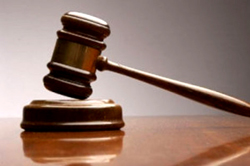
The media and judiciary
If you can't beat them – sue them

It has already become widely known that the number of individual criminal and civil charges against journalists has risen dramatically since 2001. Another trend is noticeable: journalists have won many of the criminal legal cases against them, but lost a great number of the civil proceedings based on the same facts. This – in short – reeks of a form of suppression of freedom of the press.
Here we have another difference that is very important in this issue: the difference between justice and the law. If civil cases systematically end with unfair verdicts against journalists and with huge financial compensations awarded to claimants for their emotional pain (in all cases without any evidence of such pain), while at the same time criminal courts acquit journalists of the same charges (hopefully to spare the country of the embarrassment before the European Court of Human Rights in Strasbour) – then it is obvious that something is wrong.
Let us go back to the already mentioned difference between the justice and the law. The judges are rightfully expected to eliminate this difference as much as possible – and it is indeed possible. For example: judges are allowed to reject any obviously illegal, feeble-minded, impertinent and/or late legal claims; in fact, judges are fully entitled to do that. It is their right and their duty to consider the journalists' defence impartially and taking into account both the Public Information Law and the practice of the European Court of Human Rights. The main problem (which is increasingly more obvious) is that many judges do not know the Public Information Law and could not care less about the European Court. Once upon a time, during the "communist dictatorship", there were specialized judges for the press; they knew the law by heart and their verdicts were usually much more fair (I know from the first hand because I reported on many of such proceedings). There were even cases when judges called private claimants over the phone and asked them to give up on their claims because they felt the case was too senseless.
Today we have a situation that is even worse than it was during the regime of Slobodan Milosevic, his fascist cronies and the bunch of traitors, with the exception of – of course – Vucic's evil law of 1998. Today, judges are filled with fear and accept any claims, even the silliest ones, and even those that are past legal deadlines; they pass verdicts against journalists although the verdicts violate the provisions of the Public Information Law; they reject exculpatory evidence; and, in the end, courts of appeal uphold such verdicts without any further analysis.
The Law stipulates that journalists are allowed to report the words spoken by members of parliament during parliamentary sessions and to refer to them; the Law guarantees that journalists are free to rely on sources they have every reason to believe to and on documents that have been proven accurate beyond doubt, to use previously published and legally unchallenged information, and to state blindingly obvious facts. The Law also sees the difference between factual statements and opinions; etc.
It would take too much space to list all the verdicts that violate the aforementioned legal guarantees, but I hope that readers read newspapers and have formed their own opinion. Notorious criminals (some of them from prison) have brought libel cases against journalists and won, although the courts received official police records of their criminal careers. A woman sued journalists because they published a picture of her holding Milosevic's portrait during a public rally, which she is now ashamed of; she won her case. A lying general brought charges well past all legal deadlines for an issue that was obvious and beyond any doubt; his case was dismissed only after several months. A criminal has won damages for "emotional pain" and later sentenced to prison for precisely those crimes related to the "emotional pain". All of the journalists' claims filed before the European Court of Human Rights have been won, and this tendency will obviously continue in future.
In order to avoid charges of "negative criticism" (as communists used to call it), I humbly propose a "positive alternative solution":
First: Immediately begin training of a group of worthy judges at the level of higher courts, courts of appeal and the court of cassation. This training should be related to the Public Information Law, media laws and the Article 10 of the European Convention of Human Rights that is accepted by the European Court. In this way we would have judges who are trained, professional and worthy of such specific matters.
Second: Introduce the practice that says that judges of involved courts (higher courts, courts of appeal and the Constitutional Court as the last instance) will be removed from their positions if their verdicts are overturned in Strasbourg.
Third: Such judges will be required to compensate the damage to the Republic of Serbia because of harm done to its reputation, as well as to the damaged parties, caused by their bad verdicts.
My humble opinion is that these proposals would regulate media rights, secure the freedom of the press and establish the rule of law – and not only for journalists.
Milos Vasic
MC Newsletter, July 2, 2010
View all comments (0) Leave a comment
Published comments contain opinions that are not the opinions of Media Center. Responsibility for the content of messages and their accuracy lies on the website users who posted them.
 |
| The content of this article does not necessarily reflect the view of the Media Center. The author bear full responsibility for the content of the text. |




